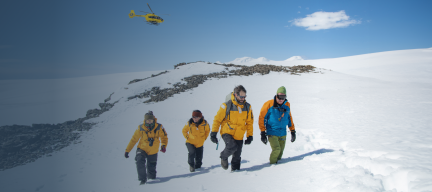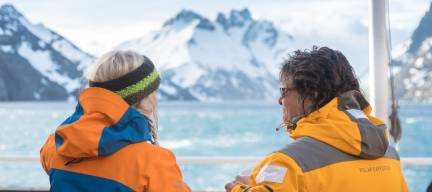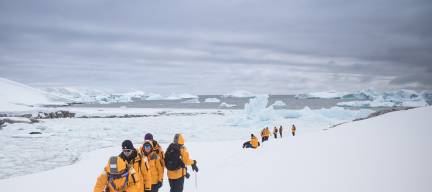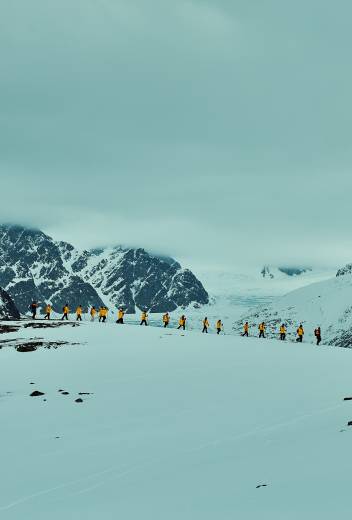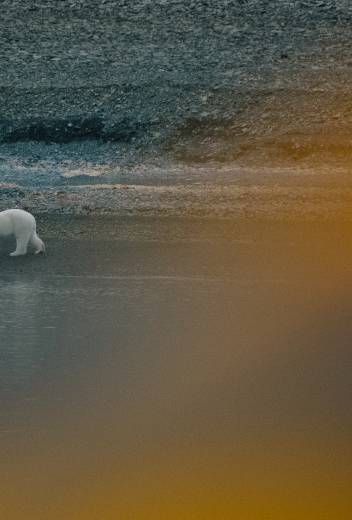Early in the Arctic expedition season each year, passengers have a unique opportunity to participate in the age old, traditional activity of snowshoeing in Norway’s Arctic paradise, Spitsbergen. Whether you’re a first-timer or a snowshoeing aficionado, these tips will help you make the most of the experience.
Snowshoeing is a fantastic way to get an up close and personal look at the vast Arctic landscape around Spitsbergen, the largest island in Norway’s Svalbard archipelago. It’s the lowest risk winter sport and is easy to learn; in fact, since 2008, snowshoeing participation in the United States has grown 40.7 percent, according to the Outdoor Industry Association. It’s no wonder it’s such a popular expedition option for our passengers.
Passengers on our Tromsø, Bear Island & Spitsbergen expedition may have the option of snowshoeing (weather permitting) in the Smeerenburg area, home to a memorial in honor of 17th and 18th century whalers.
It’s important to go early in the season, while the snow is still on the ground. Snowshoeing enables you to reach areas inaccessible after the annual thaw.
So how do you prepare for a snowshoeing expedition in the Arctic?
1. Dress the Part
Our snowshoeing expeditions don’t go out in inclement weather, so you’re more likely to find yourself trekking in moderate cold, under the 24-hour sun. It’s important that you dress in layers, with moisture-wicking fabrics closest to your skin. Cotton isn’t a great material for moving sweat away from your body, as it tends to absorb moisture and dries slowly. Try a synthetic material like polyester or a microfiber for your innermost layer.
Proper outerwear is, of course, critical in any outdoor Arctic adventure. Our Quark Expeditions Parkas (included for passengers) are insulated, waterproof, seam-sealed and hooded to ensure protection from the elements. Our parka is a 3-in-1 jacket, enabling you to remove the warmer outer shell while keeping the fleece jacket liner, if desired.
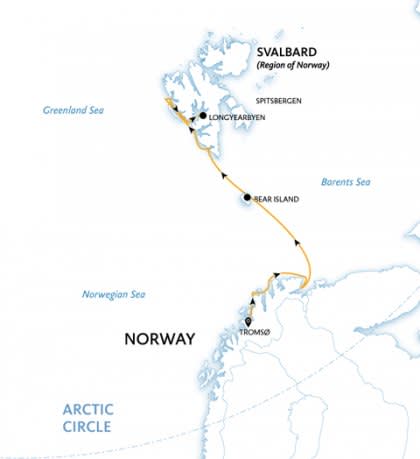
2. Protect your Skin & Stay Hydrated
Yes, you can get sunburnt in the Arctic! The sun’s UV rays reflecting off the white snow can easily burn exposed skin, making sunscreen a must for a fair weather snowshoe trek.
First-time snowshoe trekkers might be surprised at just how physically exerting it can be. As you power your way across the snow-covered Spitsbergen landscape, you may feel your heart rate increasing and will probably even break a sweat. Sip water often to ensure you don’t get dehydrated.
3. Choose Your Footwear Wisely
For the same reason cotton isn’t a good choice for your first layer of clothing, you should avoid cotton socks for outdoor winter activities. Instead, wear wool or wool/silk socks to keep your feet warm and dry.
Waterproofed hiking boots are a great choice for snowshoeing in Spitsbergen, but snowboarding boots are also an option. However, the rubber boots provided free of charge by Quark are warm, comfortable, waterproof and you don’t have to pack them.
4. Don’t Sweat the Small Stuff
There is definitely a learning curve as your body adapts to the way you move in snowshoes. You might stumble, trip or even lose a shoe. Be prepared for the missteps and don’t sweat it! Our snowshoeing expeditions are for trekkers of all levels and you won’t be left behind. Guaranteed, the other passengers are more interested in the spectacular views than your athletic form in snowshoes.

5. Understand the Basics
Our expert guides will help you get outfitted with snowshoes and teach you the basics before you set out. Here are a few important things to keep in mind:
- Backing up in snowshoes is difficult. If you need to double back, turn around and keep moving forwards rather than trying to walk backwards.
- Dig your toes in if you find yourself moving up an incline.
- Stretch before you head out. Your stance will naturally be wider for snowshoeing than walking, so you may find you’re using muscles that don’t often get a workout.
- If you need to go down a hill, crouch slightly, bending at the knees, to lower your center of gravity and help you keep your balance.
6. Bring Your Camera
Snowshoeing in Spitsbergen is an activity few the world-over have had a chance to experience and no one has your unique perspective. There will be plenty of opportunities for pictures of the stunning landscape. Don’t forget to share your pictures with us on Facebook!
Snowshoeing Spitsbergen: Accessing the Inaccessible
The snowshoes we use on our expeditions are lightweight and more forgiving than the old wood-weave versions you might have known years ago. Even if you’ve tried snowshoeing before, give it another shot on one of our Spitsbergen trips.
It’s a unique opportunity to trek over the snow to areas you simply can’t reach on foot early in the season; to explore hidden alcoves, enjoy panoramic Arctic views and sneak a peek at life as it might have been thousands of years ago.

